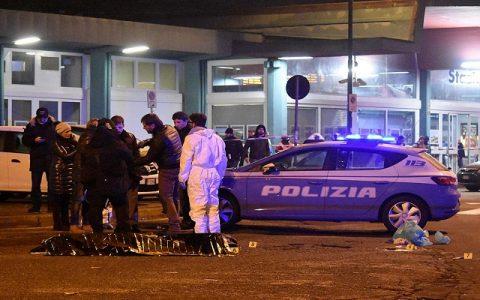
Anis Amri – the most wanted man in Europe is killed in Italy after routine police control
When hero cop Luca Scata shot Europe’s most wanted man, Anis Amri, it brought to an end the Berlin attacker’s four-day flight which saw him travel three different cities in three different countries.
Alberto Nobili, coordinator of the Anti-Terrorism department at the District Attorney’s Office in Milan says Amri ended up in the Italian city after travelling from Berlin to the French city of Chambery and via a stop in Turin.
The drive between Chambéry and Berlin takes about 11 hours. The train ride between Chambéry to Turin takes just under three hours. Whatever method the 24-year old took, he would not have needed to show a passport because he was travelling within the Shengen area which allows passport-free travel.
The Italians were unaware that the Tunisian was amongst them.
He had recorded a video message for Islamic State, it emerged on Friday.
Islamic State adherents are encouraged to send out such video pledges before launching attacks, The New York Times reported. Similar claims have been made by men who carried out assaults in Paris and Orlando, Florida. The videos have been recorded on laptops and cellphones and distributed through mediums like Facebook Live
“We had no intelligence that he could be in Milan,” Milan’s police chief Antonio De Iesu said.
It was only that Amri was loitering near the train station near the Piazza Primo Maggio, in Sesto san Giovanni, Milan at 3am that police patrolling the area asked for his identification, suspecting he might be a burglar.
When Amri pulled out a gun, it was clear he was a far more dangerous sort of criminal, although they had no idea he was Europe’s most wanted fugutive who had managed to traverse undetected three countries across the continent.
He shot at one of the policemen, lightly wounding him in the shoulder.
Amri then hid behind a nearby car but the other police officer, a trainee, managed to shoot him once or twice, killing him on the spot, police said. Amri was identified by his fingerprints. He did not have a phone on him and was carrying a small pocket knife and a few hundred euros.
On the night of the attack German police had arrested a 23-year old Pakistani migrant who denied involvement. He was later released due to a lack of evidence.
Amri originally came to Europe in 2011, reaching the Italian island of Lampedusa by boat. He told authorities he was a minor, though documents now indicate he was not, and he was transferred to Catania, Sicily, where he was enrolled in school.
Just months later he was arrested by police after he attempted to set fire to the school, a senior police source said. He was later convicted of vandalism, threats, and theft.
He spent almost four years in Italian prisons before being ordered out of the country after Tunisia refused to accept him back in 2015 because he had no identification papers linking him to the north African country.
He moved to Germany and applied for asylum there, but this was rejected after he was identified by security agencies as a potential threat.
Source: /Smh





